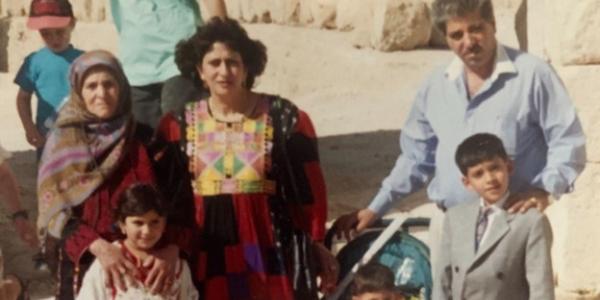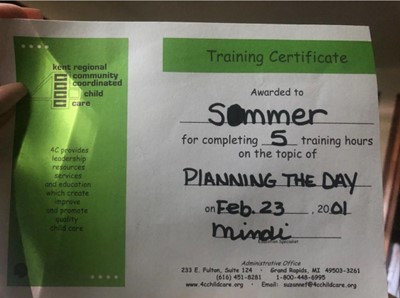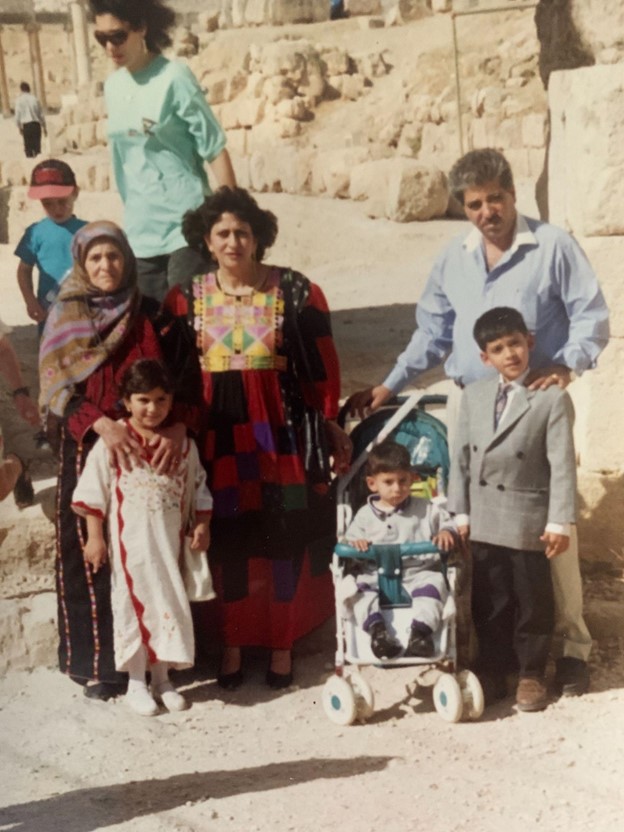Rooted in History, Blooming in the Present: Drawing on My Early Childhood Story to Create Inclusion and Community

You are here
 The earliest memories of early childhood education ingrained in my mind involve my begging to attend my mom’s Child Development Associate (CDA) classes at our local community college. I was 8, and she was an immigrant mother of three. With much hesitation, discussion with her teacher, and some luck, I became an honorary member of the CDA graduating class of 2001. My love for learning and education was sparked during that time with my mother, but it grew exponentially over the years.
The earliest memories of early childhood education ingrained in my mind involve my begging to attend my mom’s Child Development Associate (CDA) classes at our local community college. I was 8, and she was an immigrant mother of three. With much hesitation, discussion with her teacher, and some luck, I became an honorary member of the CDA graduating class of 2001. My love for learning and education was sparked during that time with my mother, but it grew exponentially over the years.
Seven months after receiving my honorary certificate, my world and so many others were flipped upside down. I was in third grade when the tragedy of 9/11 occurred.
The entire day, week, and month after this event was a blur. I remember my mother frantically coming to the school my brothers and I attended and pulling us out. We didn’t return for some time. I didn’t understand it then, but reflecting now, I know my mother was fearful: We were the only Palestinian-Muslim family in the school. My mother feared retaliation, confrontation, misunderstanding, and much more.
My brothers and I stayed home for what seemed an eternity. Our teachers stopped by to bring us homework, check on us, and offer their love and support. This seemed so small to me as a child (homework, yuck). Now, as an adult, I look back and see that the actions of my educators took great courage and bravery.
These events molded my professional career goals. I wanted to grow up and make other children feel the love I had for my teachers, but I also wanted to ensure that no child ever felt as if they didn’t belong—as my brothers and I had felt. Fast forward to the present day, and I continue to work on this promise I made myself in third grade. Here, I share my experiences and passion for culturally responsive teaching and inclusive practices, how aspects of my identity have influenced my work with children, and how I connect with other educators to honor, include, and celebrate children’s identities to create caring communities of learners.
A Passion for Responsive Teaching and Inclusive Practice
Once I graduated from high school, I began working in a classroom with children from historically marginalized and underserved communities. My work was so powerful, but I had a nagging feeling telling me to do more! After a few years of teaching young children, I knew I wanted to have a further impact on my community, which led me to early childhood administration. I began working with directors of sites, teachers, and other administrators. I created and facilitated professional development and coaching sessions centered around high-quality, culturally responsive teaching and developmentally appropriate practice.
My passion for culturally responsive teaching and inclusive practices led me to become the diversity, equity, and belonging consultant for my local intermediate school district in Michigan, which serves as a regional agency for the surrounding area. I stayed in this position for three years. It allowed me the privilege and positionality to connect with teachers, administrators, superintendents, and most importantly, students in my county. I facilitated and presented professional development centered on diversity, equity, inclusion, and belonging. I connected with students from pre-K through adult education, working to ensure they had a sense of belonging and knew that they were able and worthy to take up space.
In my current role as program manager for Wonderschool, I now have the privilege of working alongside early childhood education providers who want to open an early learning center or home-based program in our state. As program manager for Michigan, I am tasked with removing barriers, creating solutions, and supporting these educators as they do work that often feels lonely and difficult.
Knowing these challenges, I came into this role with a very strong sense of needing to build community. My most successful endeavor has been to invite local and state partners to present during our 12-week optional training course to support potential child care providers. During this course, we review aspects of child development, including early childhood developmental milestones and early learning standards, small business basics, and more. During the final class meeting, which culminates in a graduation, I invite a panel of early childhood experts from various settings and roles to talk to the class. This panel focuses on the importance of creating and maintaining community. It addresses the difficulties and triumphs of the work in the field and offers encouragement so that educators understand their work is not as siloed and lonely as it may sometimes feel. (See “Excerpts from a Panel Discussion,” below.)
Excerpts from a Panel Discussion
To bring this work alive, I share here an example from a recent cohort panel conversation. We begin the panel discussion by asking the question, “What has been one of the best networking and professional growth experiences you would recommend to others in the field?” This question sets the tone for the remainder of the discussion.
One panelist, the director of early childhood education for a local district, answers, “You need your people. This field can be so isolating, you need people to lift you up and be there for you.” The participants nod in agreement and chat about the impact the community we have built in the cohort has had on their practice. The panel continues to discuss how critical it is to take care of yourself so that you can support families and children to your fullest potential.
The last question I ask the panel is, “What is a piece of advice you would have loved and found necessary at the beginning of your career?” A panelist, a community liaison for early childhood education for our local community college, begins the conversation by saying she wished someone had told her at the beginning of her career that it was okay to not know everything. That you will continue to learn and grow in the field, and that is okay. Another panelist, a retired early childhood director and early childhood content creator, chimes in to say they wished they had known how to ask for help sooner rather than later. They talk about how no one can help you once you’ve already drowned, but if you speak up early enough, people can throw you a life vest and help you. The last panelist, the director who began the conversation, speaks about how they wished they had started their networking and team building earlier in their career. The panel concludes with closing remarks on how critical community is to this field and how impactful it can be to have a support system around you to keep you motivated and optimistic.
Community in Action
Community is critical to the early childhood education field. There are connections you make today that will always have a place in your heart. Whether it’s the CDA instructor who taught your mom when you were 8 years old coming back to do a training for you now or someone you made a connection with today, the importance of community will always be paramount. Third-grade Sommer did not have the words to advocate for herself in needing a community, but today’s Sommer understands the value of this and will continue to advocate for herself and all children and families.
I am now working with my fourth group of providers. I have increased the number of community and state partners who present. I intentionally choose panel members who reflect the diversity of the educators I serve. I am continuously in awe of how much my history continues to show up in these sessions: third-grade Sommer needed a community; teacher Sommer was part of a bigger community; today’s Sommer is creating a community.

This experience seems so full circle to me. I see my mother and myself in so many of the early childhood educators I interact with. I hope they too know they are more than worthy of taking up space and deserve to fulfill their dreams. As I continue to grow my passion for early childhood, I continue to also grow my personal education journey, pursuing my doctorate in organizational change and leadership. Third-grade me would never have dreamed of being where I am today.
My hope is to continue to take all of my lived experiences, knowledge, and passion to those who may benefit from it. I will continue to advocate for all of the unheard voices—for all of the third-grade Sommers. I will continue to work each day to ensure the promise I made to myself stays relevant and true. I will continue to grow up and help other children feel the love I had for my teachers and ensure that no child ever feels the sense of not belonging that my brothers and I did.
Third-grade me would be so proud of the work I do today.
Photographs: courtesy of the authors
Copyright © 2023 by the National Association for the Education of Young Children. See Permissions and Reprints online at NAEYC.org/resources/permissions.
Sommer Jabbar, MEd, is the program manager for the state of Michigan through Wonderschool. Sommer has worked in the education sector in various capacities, including as a teacher, training and technical assistance manager, director of education, and diversity, equity, and inclusion consultant for her county. Sommer has worked and continues working with historically marginalized communities to bring more awareness to educational inequities and opportunities. Her doctorate of education will be conferred in May 2024. [email protected]